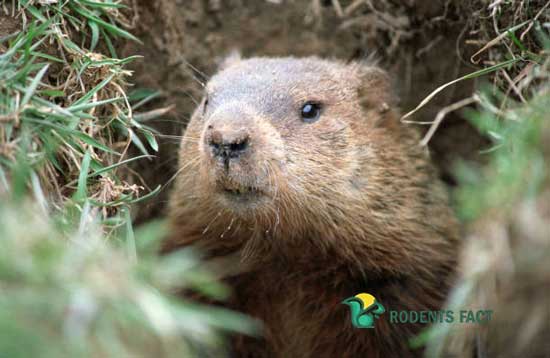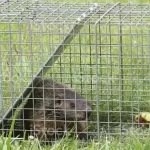How to Kill a Groundhog with Antifreeze?
Groundhogs might give you a cute face but they are not as cute as they look! They will not only damage the plants and crops but if they build burrows underneath your building, the house will be at stake too!
So, in short, you have to get an idea to get rid of the groundhogs. There are ways to catch them but the methods are lengthy. Check out your state law and if it permits using poison for killing groundhogs, you are ready! Let’s learn a bit about killing groundhogs with antifreeze and if this works or not!
Will Antifreeze Kill Groundhogs?
Antifreeze kills groundhogs. Its main ingredient is ethylene glycol (EG)—a potent compound that makes it extremely toxic and an effective method for poisoning and killing these pesky woodchucks.
However, you should keep in mind that this method is only moderately effective and may not always work, especially if you don’t use it correctly or if the animal doesn’t take it.
Make sure you use an antifreeze that contains ethylene glycol. You also need to ensure you put enough amount of antifreeze for proper dosing. And don’t mix it with water, or you’ll make it less effective.

We also advise you to put the antifreeze in a bottle. Cut a small hole at the side of the bottle so the animal can easily stick its head and drink the antifreeze. The idea is to create something close to a birdhouse. Place it near the groundhog’s hole, where it can easily see it when it comes out.
Now, when the groundhog ingests the antifreeze, the EG inside causes severe damage to its central nervous system and its effects appear in about an hour. Death won’t happen instantly but the animal will surely die if it takes a good amount of it.
Since the antifreeze has a sweet smell and taste, the woodchuck gets easily attracted to it and drinks it.
However, before you use this method on the groundhogs, it’s important to research your local law guidelines to see if they have restrictions about this groundhog elimination method. Some states prohibit poisoning groundhogs. In addition to that, check if there are laws against putting poison on the soil due to groundwater contamination.
If your state prohibits killing groundhogs or putting toxic chemicals on your property, you should try using other “safer” control methods. Else, you might attract some steep fines or even some jail time!
What is Antifreeze?

Antifreeze is a liquid that helps in lowering the freezing point of water. In this manner, it protects a system from the negatives effects of ice formation. This is commonly known for automobile usage. Adding it to the water, it is used in the cooling systems of vehicles. It helps in preventing damage to radiators.
Poisoning Groundhogs: Legal vs. Illegal
So here, we are talking about killing an animal. Killing groundhogs with bubble gum is very common to the lawn owners that have seen groundhogs destroying their crops and plants. And antifreeze is a poison for any small animals like rodents.
But can you genuinely kill a groundhog? Is it legal in your state? In most countries, you can kill rats, mice, or groundhogs. But in some states, you will require a special permit for killing groundhogs via poison. This works for almost all small animals like these rodents.
Astoundingly, in some states, using rat poisons along with mothballs on groundhogs is illegal too. So, if you can kill a rat or a mouse doesn’t mean you can poison the groundhog the same way. For this, you have to go through the state law first.
If it is illegal in your state, you can simply plan on catching it and then leaving it somewhere else to safeguard your property. Have a look at how to catch a groundhog with a milk jug and find ideas!
The Idea of Antifreeze for Groundhogs
Antifreeze is known for helping the engine of your vehicle when there is extreme temperature. When the outside temperature will change from hot to cold, coolant is pumped throughout the engine block. In this manner, the operating temperature is kept uniform.
In antifreeze, there is a chemical called ethylene glycol. This ingredient is poisonous for specific animals. Keeping this ingredient in mind, the lawn owners and professionals tried using antifreeze on rodents. You already know that groundhogs hate some specific things.
They hate spicy food along with some specific smells. Check out what smells do groundhogs hate before you use anyone to get rid of them! But they don’t hate antifreeze! It is colored and it is sweet. When they will smell the antifreeze, they will get the sweet smell and will taste the poison.
Will groundhogs drink Antifreeze?
The rats and mice of your house, have you ever used antifreeze on them? If you have already done this, you know how it works. Along with the rats and mice, the groundhogs and such small animals can be killed easily with antifreeze.
Antifreeze almost kills everything. If you are planning to kill any rodent with antifreeze, you can dose it properly with Antifreeze and you can easily kill it. But in this case, the process should be perfect when it comes to dosing it.
Also, it’s necessary to make sure that the perfect amount of antifreeze is used for poisoning the groundhog. And finally, yes, the groundhog will drink antifreeze. Come one, it’s sweet, why not!
The Myth about Antifreeze
There is a common myth about antifreeze- it doesn’t work on groundhogs, it only works on rats. But no, this is not right. Antifreeze works on almost all types of rodents. Not only rodents, but you can also kill almost all small animals with the help of antifreeze.
- Yes, the proper amount of ethylene glycol from the antifreeze will only kill the rodent. But if you use a bit less in amount, it won’t work on the rodents. The reason for the common myth about antifreeze not killing groundhogs is because the lawn owners don’t use the right amount of antifreeze.
- In some cases, you might see that antifreeze is not working for the groundhogs or any other rodents like the rats or mice even if you using the right amount. Here, the problem is related to the antifreeze you are picking up. It’s necessary to keep in mind that not all antifreeze includes the ingredient ethylene glycol. So, while picking up this liquid for killing groundhogs, you must choose the one that has ethylene glycol chemical included.

How to Kill Groundhog with Antifreeze
Here, we will tell you a short method of killing groundhogs with antifreeze that has ethylene glycol. Check out the method, it will surely work.
- First of all, you have to get your hands on a plastic bottle. Go for the 2-liter pop bottle for this job. This will work better than any other size.
- Once you have got the plastic pop bottle, get something sharp and cut a hole on the plastic bottle. Here, you have to cut the hole in the side of the bottle. Make sure you are careful when you are cutting the hole. The hole should not be too large, settle for a small hole. The hole should be of the right size for the groundhog to enter.
- Now, go through the antifreeze having ethylene glycol chemical. Add this poison to the bottom of the bottle. You don’t need too much. Measure a bit of ethylene glycol and add it there. You don’t need to add water to it; otherwise, it won’t be much effective.
- Place the bottle near the holes of the groundhogs. Or you can also place this one around your crops. When the groundhog comes out of the hole and sees it, it will taste it. The taste of antifreeze is sweet and thus, it will like it. This will work as a poison for the woodchuck.
Wrap Up
Killing these cuties might hurt you a bit but you cannot let them ruin your property! And if you are tired of them hurting your property, safeguard them by killing groundhogs with the help of antifreeze. They will tell you that you can’t do it, but the right amount will eradicate them for sure!




